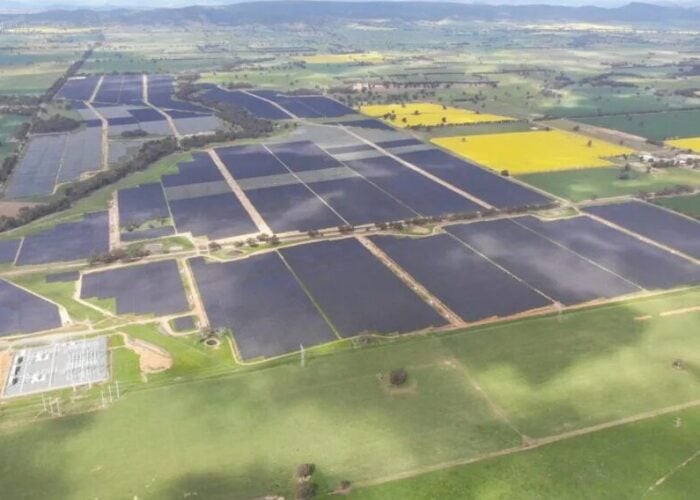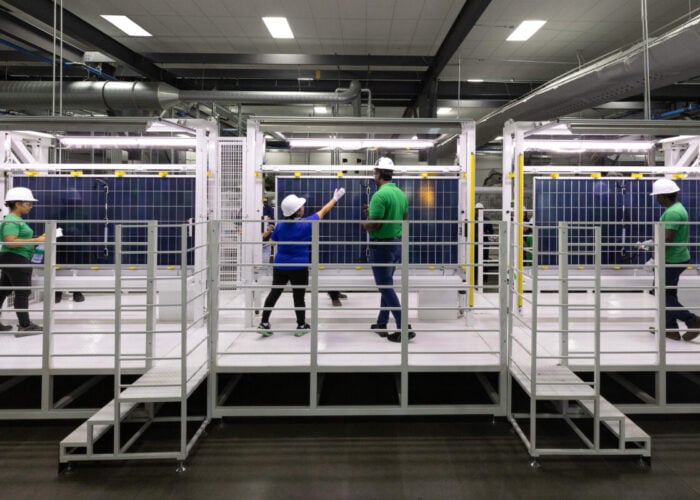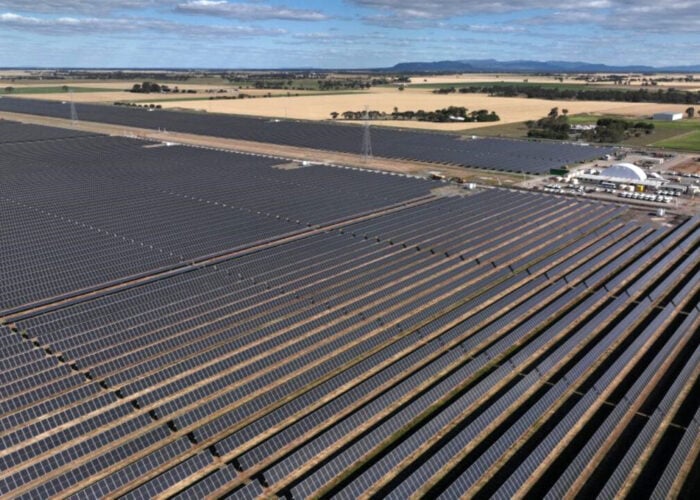
If the previous two years were characterised by the phrase, ‘he who has silicon rules the world,’ then the current era could be described as very much one where ‘cash is king.’
On 10 April, China’s Silicon Industry Branch released its report on the latest silicon prices. The price of n-type silicon rod experienced another sharp decline, with the transaction price range dropping to 58-60 RMB/kg (US$8.01-8.29/kg) and the average transaction price of 58.6 RMB/kg (US$8.10/kg), down 3.30% month-on-month.
Try Premium for just $1
- Full premium access for the first month at only $1
- Converts to an annual rate after 30 days unless cancelled
- Cancel anytime during the trial period
Premium Benefits
- Expert industry analysis and interviews
- Digital access to PV Tech Power journal
- Exclusive event discounts
Or get the full Premium subscription right away
Or continue reading this article for free
The quotation for p-type silicon rod was suspended at the end of March, and the most recent price update as of Sunday, 14 April, also shows a substantial decrease. The transaction price range for p-type monocrystalline silicon is now 48-51 CNY/kg (US$6,63-7.05/kg), with an average transaction price of 48.7 CNY/kg (US$6.73/kg), a drop of 18.83% from the previous quotation.
The price of n-type granular silicon continues to decline, but following this round of price reduction, the price gap between n-type and p-type silicon rod has narrowed. The transaction price range of n-type is now at 51-54 CNY/kg (US$7.05-7.46/kg) and an average transaction price of 52 CNY/kg (US$7.18/kg), down 5.54% month-on-month.
| Project | Highest | Lowest | Average | Fluctuation | Fluctuation % |
| N-type transaction price | 6.00 | 5.50 | 5.86 | -0.20 | -3.30% |
| Recycled material transaction price | 5.30 | 5.00 | 5.03 | -1.25 | -19.90% |
| Monocrystalline dense material transaction price | 5.10 | 4.80 | 4.87 | -1.13 | -18.83% |
| Monocrystalline cauliflower material transaction price | 4.80 | 4.50 | 4.64 | -0.95 | -16.99% |
| N-type granular silicon transaction price | 5.40 | 5.10 | 5.20 | -0.30 | -5.45% |
The above prices are determined by the quarterly production figures of n-type material, recycled material, dense material, and cauliflower material from ten polycrystalline silicon manufacturing enterprises and are calculated as a weighted average.
The production of the ten companies involved in the price statistics account for 88.75% of the total domestic production in Q1 2024, with a proportion of 84.58% for monocrystalline material. The prices are inclusive of tax, and the fluctuation is compared with the previous price.
The cost of silicon for second and third-tier enterprises is currently between 50-60 CNY/kg (US$6.91-8.29/kg). At these prices, some companies can no longer turn a profit and have ceased production. Some silicon enterprises are approaching the cost line, and a few companies have even seen their costs reverse.
The Silicon Industry Branch points out that the silicon segment is now facing comprehensive losses. In the face of ultra-low quotations from downstream, silicon enterprises are very resistant, and the price divergence between upstream and downstream is gradually increasing.
Polysilicon companies are aware of a large price decline, and the downstream pressure to lower prices has exceeded expectations, leading to some enterprises being unwilling to operate at a loss. Looking forward to this year’s silicon prices, Lan Tianshi, the co-CEO of GCL Technology, predicts that: “In 2024, polysilicon price will approach the cost line of excellent enterprises.”
How many polysilicon manufacturers will survive this winter?
At this juncture, the 2023 annual reports disclosed by several leading polysilicon companies have attracted widespread attention from the market.
Looking at the performance of several companies that have already announced their results, such as Daqo, GCL Technology, and Xinte Energy, the net profit in the silicon segment declined by between 60% and 80%, with many companies affected by the decline in silicon prices.
| Company | Revenue | Year-on-year increase or decrease | Net profit attributable to parent company | Year-on-year increase or decrease |
| GCL-SI | 337.01 | -6.2% | 25.1 | -84.7% |
| Daqo | 163.29 | -47.22% | 57.63 | -69.86% |
| Xinte Energy | 307.52 | -16.51% | 43.45 | -67.37% |
In response to this, Xu Xiang, the vice chairman of Daqo, stated that: “The decline in polysilicon prices in the early stage has led to losses for some companies. Recently, there have been no transactions for p-type silicon rods, and everyone is uncertain about where the lowest price will be.
“Currently, polysilicon enterprises with prices exceeding 65 CNY/kg (US$8.98/kg) have no competitive advantage. Factories that cannot control costs or improve quality will cease production, and once they stop, it will be difficult to restart. Stronger companies can weather this current phase.”
New entrants to the silicon sector may not be able to survive this winter. Some of the new entries to the polysilicon industry have costs exceeding 60 CNY/kg (US$8.29/kg), which is far from the cost levels of the industry’s first-tier companies, which are around 40 CNY/kg (US$5.53/kg). For example, Tongwei disclosed in its semi-annual report that the company’s polysilicon production cost has dropped to less than 40 CNY/kg (US$5.53/kg), which is at the leading level in the industry, giving it a significant advantage in the cost-oriented silicon segment.
Daqo’s annual report shows that in 2023, the company’s unit production cost, including sales expenses, for the whole year was 48.70 CNY/kg (US$6.73/kg), a year-on-year decrease of 19.53%; the cash cost was 41.6 CNY/kg (US$5.75/kg), and it has been on a downward trend quarter by quarter, falling to 40.68 CNY/kg (US$5.62/kg) by the fourth quarter.
Ensuring high-quality supply
Beyond cost considerations, the supply of high-quality n-type silicon will become the second major challenge for polysilicon enterprises this year.
In 2024, n-type cell technologies, such as tunnel oxide passivated contact (TOPCon), heterojunction technology (HJT) and back contact (BC) are expected to achieve breakthroughs and complete the technological upgrade to p-type passivation emitter rear contact (PERC). PERC is expected to account for no less than 60-70% of the market share throughout the year, of which over 85% may be reached in the fourth quarter.
Against this backdrop, this year will also mark the first year where n-type silicon replaces p-type silicon across the sector. Industry estimates suggest that n-type silicon will account for 70% of the market, while p-type silicon will make up the remaining 30%, with n-type silicon’s market share projected to be no less than 90% after 2024.
Despite the widespread discussion of overcapacity in the PV industry, high-quality capacity remains very scarce, and n-type silicon is one of them. Due to the higher technological barriers to producing n-type silicon, only a few polysilicon companies in China, such as Daqo, Tongwei, GCL Technology and TBEA, are highly proficient in producing n-type technology. These companies are also long-established silicon firms that have been in the first tier for many years.






